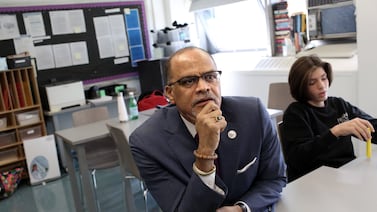Two Democrats won seats on the state board of education Tuesday, maintaining the party’s 6 to 2 edge on the panel that shapes Michigan’s learning standards and oversees the state education bureaucracy.
Ellen Cogen Lipton and Jason Strayhorn filled the two open seats on the eight-member board. Democrats have controlled the panel for most of the last two decades.
Lipton won 2,456,899 votes, or 24.5%, while Strayhorn earned 2,353,817 votes, or 23.5%, edging out their Republican challengers in a tight race. Rural Antrim County was the only county that hadn’t reported election results as of Thursday morning, but its votes won’t be enough to change the outcome.
Lipton, a Democrat, is an attorney who holds a bachelor’s degree from Williams College and a law degree from Harvard Law School. She served as a Michigan state representative for six years. Lipton says the state should provide more funding to disadvantaged students, deemphasize standardized tests as a measure of school quality, and increase regulation on for-profit charter schools. (The board does not directly make school funding decisions, but advises the Legislature on the state education budget.)
“We need to give a lot more autonomy to teachers to do what they were professionally trained to do, which is to teach students,” she said, adding “teachers spend more time on standardized testing and we are not letting them really deliver high quality instruction.”
Strayhorn, a Democrat, is a licensed real estate broker and Michigan State Football analyst for Fox Sports. He holds a bachelor’s degree from Michigan State University.
He is critical of Michigan’s read-or-flunk law, which would hold back third graders who score too low on standardized reading tests, and says the state should deemphasize standardized tests.
“Students in impoverished areas, including inner city and rural districts along with special needs students, require more funding,” he said. “We need to educate them on the same level as more affluent suburbs.”
The state board’s main functions are to establish policy, set standards, and hire and oversee the state superintendent, who in turn oversees the Michigan Department of Education.
Many key state education policies, including those related to funding, testing, and teacher preparation, are made by state lawmakers, not the state board.
The Republican candidates were Tami Carlone and Michelle Frederick. The two Democratic incumbents, Michelle Fecteau and Lupe Ramos-Montigny, did not run for reelection.
Minor party candidates were Bill Hall and Richard A. Hewer, Libertarian Party; Karen Adams and Douglas Levesque, U.S. Taxpayers Party; Mary Anne Hering and Hali McEachern, Working Class Party; and Tom Mair, Green Party.








